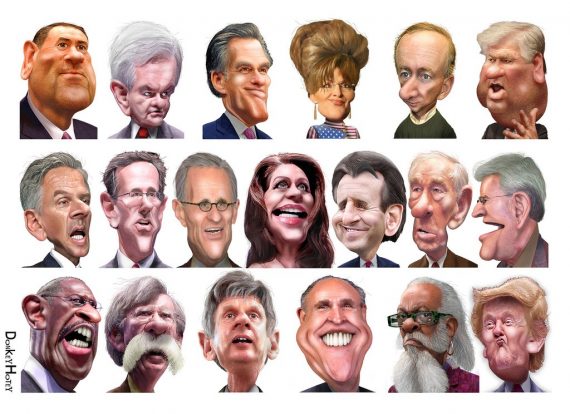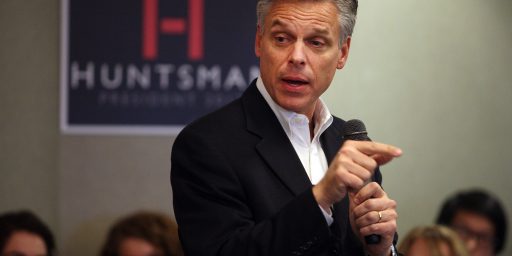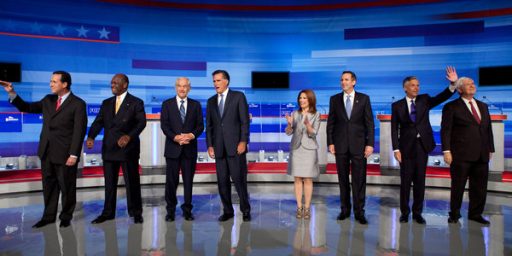Republican Field Not Weak As You Think
The GOP doesn't have a charismatic superstar waiting in the wings. That's okay.
Ramesh Ponnuru makes a strong case that all the handwringing about the weakness of the Republican field is misplaced. First, he notes the qualifications of the top-tier candidates:
The three people most likely to win the Republican nomination — Mitt Romney, Tim Pawlenty and Jon Huntsman, according to Intrade.com — have all been governors. Two of them were governors of states that Obama carried in 2008. By contrast, the top three candidates for the Democratic nomination last time around (Obama, Hillary Clinton and John Edwards) had a combined zero days of executive experience. This time, even some long-shot Republican candidates have stronger resumes than that: Libertarian gadfly Gary Johnson, for example, was a two-term governor of New Mexico.
Romney is well-versed on the issues and fast on his feet. Pawlenty, by addressing voter concerns about health care and traffic congestion while holding the line on taxes, managed to win re-election in deep-blue Minnesota in 2006, when Republicans were routed nationwide. Huntsman was a popular governor of Utah and, as the former ambassador to China, is knowledgeable about the country’s most important economic relationship.
All three have real political skills, and real accomplishments. All can credibly challenge Obama on the economy: Romney and Huntsman because of their business backgrounds, Pawlenty and Huntsman because their states did relatively well under their leadership during the worst of the recession. None of these men is positioned on the right edge of their party. If one of them wins the nomination, Democrats may be able to convince voters that the Republican Party as a whole is unsuited for power. But they won’t be able to make a case that the nominee is a particularly extreme member of the party.
We’re in agreement here. While there are some people in the field that I, as a Republican for three decades, couldn’t vote for, Romney, Pawlenty, and Huntsman are all plausible presidents. The weakness argument, mostly, is about charisma and star power. But Ponnuru thinks that’s misguided:
So why the disrespect? Partly it’s because the number of serious contenders is small. If Huntsman doesn’t take off, the race could well be a two-man contest between Romney and Pawlenty. The Democratic wave elections of 2006 and 2008 left Republicans with few plausible contenders (although their own wave election of 2010 gives them a deep bench for 2016). And no candidate dominates the field, giving a misleading impression about the strength any of them would bring to the general election.
Dissatisfaction with the Republican candidates is also a matter of psychology. Republicans may not like, and some of them may not even respect, the incumbent president. They nonetheless see him sitting in the Oval Office and commanding troops. They see their own candidates, by contrast, sharing a stage with a bunch of other people, some of them fringe figures. They seem small. They will keep seeming small until some of them start winning primaries and one of them wins the nomination.
Offstage, Republicans imagine, is the perfect candidate. He has to be offstage because nobody onstage is perfect. He also has to be offstage because not running is part of his perfection. If he ran, he would be another guy competing for microphone time at the debates. The other candidates would suddenly have an incentive to draw attention to his flaws.
Right now, conservatives think of Congressman Ryan as a bold, free-market visionary. Within weeks of his entering the race, he would be redefined as the longtime Washington fixture who voted for TARP, the prescription-drug benefit, the auto bailout and other bills hated by Republican primary voters.
He’s certainly right about Ryan–or any mythical candidate not in the race. Once their records are examined, people will find things they don’t like. The only candidate in my memory where that didn’t happen was Barack Obama–who had no record to speak of and managed to get all the way through an election cycle persuading all but the most hard-core Republicans that he basically agreed with them on every issue.
Unlike me and most of the readers of political blogs, most Americans–indeed, most primary voters–have barely started paying attention to the election. I live and breathe politics and policy day in, day out, regardless of how far we are from an election. And yet I know very little about Tim Pawlenty, much less Jon Huntsman. But, unless I’m badly misjudging the dynamics of the process, they’re the only plausible challengers to Mitt Romney for the nomination.
The television age has given a huge advantage to charismatic personalities. John Kennedy was the first television candidate and we’ve had Ronald Reagan, Bill Clinton, and yes, Barack Obama in my lifetime. On the other hand, we’ve also had Lyndon Johnson, Richard Nixon, Jimmy Carter, and George H.W. Bush. (Gerald Ford was never elected and George W. Bush could arguably go on either side of the ledger.)
Obama is an incumbent president who’s charismatic, likable, disciplined, and able to raise boatloads of money. He’s the odds-on favorite for 2012. But given a bad economy and the vagaries of unfolding events between now and election day, any of the reasonable Republicans have at least a puncher’s chance.
UPDATE: Apparently, this is becoming a meme. At the NYT Caucus blog, Matt Bai has re-written Ponnuru’s column almost verbatim as “Cheer Up, Republicans, the 2012 Field Isn’t That Bad.” And Jay Cost took to The Weekly Standard with “A Formidable Republican Field.” He, too, focuses on Romney, Pawlenty, and Huntsman and offers four reasons why they’re bad news “for President Obama and the Democrats.
1. Crossover appeal. Huntsman, Pawlenty, and Romney all won statewide elections by performing better than the party normally does in each state. In 2008 Jon Huntsman won 64 percent of the gubernatorial vote in Utah (an improvement on his performance relative to 2004), while John McCain won 62 percent of the presidential vote that same year. Tim Pawlenty won reelection in Minnesota in 2006 narrowly, but this was still an impressive feat considering that Minnesota retains a blue tilt and 2006 was a terrible year for Republicans in general. T-Paw won about 100,000 more votes that the Republican candidates in the 8 Minnesota House districts that year, and 200,000 more votes than Mark Kennedy, the GOP candidate for the open Senate seat. In 2002, Mitt Romney won a comfortable, five point victory in Massachusetts, despite the fact that his party is so weak in the Bay State that it ran just 4 candidates in the 10 House districts that year.
In other words, all three have demonstrated an ability to pull in voters who have previously backed Democrats, which is a requirement if the GOP is going to win the presidency back next year.
2. Records as governors. All three of these candidates earned a national reputation as governors, which will give them all an opportunity to point to their executive records in contrast to President Obama’s. This is preferable to coming up through the ranks via the House and Senate, where people don’t really “run” anything. And, as we saw with Bob Dole, John Kerry, John McCain, and even Hillary Clinton, Senate candidates often have that strange dialect known as “Senate-ese,” wherein they talk about their experience on this or that subcommittee, their support for this or that amendment, or their vital role in this or that part of the inscrutable appropriations process. Put simply, Huntsman, Pawlenty, and Romney can present themselves as men of action, rather than men of deliberation — and action is what the country wants.
3. No “gotcha votes.” There’s a second advantage that comes from not having been in Congress. When you’re in the House or the Senate, you end up having to vote on pretty much every divisive issue that the country deals with. Many of these votes are irrelevant — having to do with the legislative process or being for/against bills that have literally no chance of becoming law. Even so, the congressional record is a great place for campaign researchers go when they’re looking to smear the opposition. They can take some otherwise irrelevant vote on, say, abortion, taxes, Medicare, whatever, and turn it into a crime against all decency. Governors don’t have that problem, at least not nearly to the same degree. While some laws with controversial items might get signed or vetoed, the state legislature regularly works as a buffer for governors. And furthermore state governments do not have to deal with nearly as many divisive subjects as the U.S. Congress does.
4. No bloodbath. I’ve been pointing out for a while that it’s unlikely that the GOP will have to go through the kind of war that nearly destroyed the Democrats in 2008 — in large part because the Republican party is much more homogenous. If this is the final field (and it might not be), the chances of an extended and bloody primary fight are now even smaller. In fact, there is a growing chance that the nominee could be set by mid- or even early February. The three top candidates are very similar to each other in terms of their background and the nature of their appeal, being as they all are center-right governors who plan to emphasize their abilities to get things done. There’s really no need for an extended primary season to see which one is the preferred candidate.
We shall see. If this is indeed the field, Romney has the clearest path to the nomination. He came in a very respectable second in both Iowa and New Hampshire last cycle and the candidates who beat him, Mike Huckabee and John McCain, aren’t running this year. And he’s the runaway favorite in New Hampshire in the early polling.
Sarah Palin is the obvious wildcard, in that she would be tough to beat in Iowa. But if it’s three moderate former governors running against one another, the path to the nomination could indeed be smooth and without the damage that a fight with the Tea Party faction would cause.







Your top three have a chance at winning a general election. Can they win in the primary? Has the Tea Party effect burned out? BTW, Romney and Pawlenty suck on foreign policy. Their ignorance is staggering. Dont know yet about Huntsman, but suspect he is better.
Steve
@steve:
It remains to be seen who’ll win the primary but my strong bet would be on Romney or Pawlenty. If Sarah Palin decides to get into the race, she’s got a chance because of her star power. But I think she’d implode over the long haul.
And almost all presidential candidates suck on foreign policy. We mostly run governors. Even the Senators–and Obama was the first of those to win since 1960–tend to be selected on domestic policy prowess. There’s plenty of time to get boned up on foreign policy between now and the deep primary cycle–much less the general election campaign.
Then again, given that there’s very little light between Obama and plausible GOP candidates on foreign policy–aside from maybe Israel–it won’t likely matter.
Ultimately, of course, there are viable candidates here. And, of course, the desire for a savior is typical for any party out of power.
I do think that concern about the field is a combination of the fact that the most viable general election candidate, Romney, appears mortally wounded vis-a-vis the primary electorate because of healthcare. Huntsman, likewise, is wounded for having worked for Obama with the same voters. As such, the real fear here is, I think, that the GOP primary voters will select a candidate sufficiently fringe-y as to field a general election candidate who simply can’t win.
The whole Palin movie thing – see other thread – confirms for me that she is running. I also agree with James that she’ll implode. She is going to take all the air out of the room in the meantime though, and that will make the three horesmen of the republican apocalypse – Mitt, T-Paw, Huntsman – seem weak.
I think a lot of the unhappiness is that most of the “serious” contenders are pretty much the stereotypical “neither cold nor hot” career politicians.
If you actually believe in a need to roll back the excesses of both the Bush and Obama presidencies, does the election of Mitt Romney or Tim Pawlenty really get you anything?
The weakness with Republicans is not a lack of personality among party leaders but rather a serious lack of intelligent policies.
That will not prevent them from winning elections, but, if elected, it will prevent them from solving any of the problems we need to have addressed and will end up, once again, running us into the ditch.
Perhaps we should look at charisma as a relative property. In other words, I agree that GWB isn’t in the Reagan/Clinton league of charisma, but he didn’t run against Reagan or Clinton. He ran against Gore and Kerry. Compared to them, he seemed charismatic.
Palin is probably the only candidate that can match Obama’s charisma. So the GOP is going to be at a deficit there. And as you say, that’s quite a disadvantage.
Also worth considering: If Palin runs for the nomination and loses, I imagine a significant portion of her supporters will Go Rogue! and write her in for the general election. It could theoretically even be enough to swing a state. And Palin doesn’t seem to be the type to discourage that sort of thing. In short: Palin entering the race could be bad for the GOP even if she fails to get the nomination. It’s the downside of a charismatic candidate.
Suddenly Huntsman is mentioned in the top 3. And who told you a long time ago to keep an eye on Huntsman? Yeah, that’s right, the bald dude in the picture just to the right.
@Michael: Huntsman appeals to the elites but I’m not sure he’s a viable candidate for the 2012 nomination. But he’s a plausible president based on temperament and credentials.
My perception of what was considered the “weakness” of the Republican field is that the of the serious candidates, there’s really only one that probably won’t be called a RINO, and that’s Pawlenty.
Tim Pawlenty has “a puncher’s chance” of beating Obama?
Tim Pawlenty?
*Insert comment about drug use here*
I wouldn’t underestimate Huntsman. When George H.W. Bush announced he was running, I actually laughed out loud. To me, he was a SNL skit character who was obviously despised by Reagan and had spent 8 years going to foreign lands to attend funerals. Yes he was the adult in the room, but Republicans weren’t nominating adults. Perhaps there are some analogies to Huntsman there. That said, I think it is more likely Huntsman is running for the VP slot, intending to use the eventual Republican loser’s campaign cash to crisscross the US building up contacts and favors in anticipation of a 2016 run. But what the h*ll do I know.
The decision will be made in Salt Lake City. Can Romney hold onto the Mormon money, or will it go to Huntsman.
George H.W. Bush’s qualifications:
1. Decorated WWI combat veteran
2. Very successful businessman
3. Congressman
4. U.N. Ambassador
4. Director of the C.I.A.
5. Vice President
None of the Republican munchkins running this time around come close his resume.
Ponce said:
Ponce, I should have noted that my opinion changed once he was in office. He and Nixon are the only Republican presidents in my lifetime that I have any respect for, although Nixon will always have an asterisk. I didn’t agree with HW on many items, but always felt he was competent and took his responsibilities seriously.
Eunomia puts the idea of ‘crossover appeal’ in more context:
http://www.amconmag.com/larison/2011/05/25/what-crossover-appeal/
(excellent site, BTW)
You’re right. The Republican field can’t be as bad as I think it is. I think it is 1962 Mets bad. It is probably only 2010 Mariners bad. In any event, barring circumstances where a generic Republican candidate wins the election, Obama cruises. Against this crew, all he really needs is an 84 or 85 win season.
I feel the same way.
I notice I put Bush in the wrong war and gave him 2 #4s. Preview is your friend.
The GOP field can’t be as bad as all that … IT’S WORSE!
SJR
The Pink Flamingo
You don’t mention the strongest reason the R nominee with be “strong”: all R or D nominees are “strong” by default. The election will be determined mostly by demographics and the performance of the economy. Obama will be something like 51-47 against the generic R, +/-4 depending on the economy. Other factors (specific candidate, strength of campaign, etc.) will be +/- 1 or 2 individually under “normal” conditions, but not well correlated, meaning they will tend to average out. Palin might be -5, GWB in 2000 was maybe +5 for name and evangelical turnout, a major terrorist attack might be +5 (or -5), etc.
R partisans would be better off with a major economic meltdown in 2012 and a mediocre candidate than an outstanding candidate and mediocre economic performance in 2012.
Well said, Sam Penrose.
But here’s the problem… not one of them are real conservatives, but tend to work along the same lines as McCain for example. You will recall how that one turned out.
@Eric Florack: “not one of them are real conservatives, but tend to work along the same lines as McCain for example. You will recall how that one turned out.”
McCain’s problem wasn’t that he was insufficiently conservative but that the voters were fed up with Republicans after eight years of Bush and six years of a GOP Congress, two wars, Katrina, and a global financial collapse. A younger Ronald Reagan might have fared better, owing to more charisma and a sunnier disposition, but he’d have lost in that environment.
Then tell me how you explain the mood of the electorate today, which is decidedly far more conservative than a McCain could possibly survive. You see here’s the problem; after eight years of the centrist Bush the mood among the GOP majority was for real conservative. McCain failed on every count. I suggest that the democrats and the press (but I repeat myself ) do that very well which is precisely why they were so enamored with the idea that he was running.
notice, please, that the democrats have not been going after establishment republicans, but rather the grass roots. That’s because they see the grassroots is a bigger threat.
The fact is that enlarge plurality a merit and support cutting the size and scope of government, cutting taxes, cutting spending, do not trust government per se’ something on the order of 65% at this point support a balanced budget amendment to the U.S. constitution. The last poll I saw said something on the order of 70% oppose Obama care.
Certainly, the democrats are never going to support moving in the direction the public wanbtrs, but, and here’s the point, neither are centrist establishment republicans. Certainly, McCain is one of these. McCain spent his entire campaign bending over backwards for the left who, once McCain won the nomination, when all out to defeat him. And frankly, given the lack of support from the GOP a rank and file, it’s no surprise and that they were able to do that.
It’s as I said last year at Pajamas Media:
I tell you this in all honesty; if the GOP doesn’t come up with a real conservative, and truly start fighting for conservative principles, (And McCain and ….Huntsman Huckabee, etc, etc simply do not qualify…. )… Obama will have his second term. Not because he’s the more popular, but because the lukewarm GOP leadership is less popular among the conservative majority
To continue the thought, let’s recall the original mission statement as penned by WHB:
# It is the job of centralized government (in peacetime) to protect its citizens’ lives, liberty and property. All other activities of government tend to diminish freedom and hamper progress. The growth of government (the dominant social feature of this century) must be fought relentlessly. In this great social conflict of the era, we are, without reservations, on the libertarian side.
# The profound crisis of our era is, in essence, the conflict between the Social Engineers, who seek to adjust mankind to conform with scientific utopias, and the disciples of Truth, who defend the organic moral order. We believe that truth is neither arrived at nor illuminated by monitoring election results, binding though these are for other purposes, but by other means, including a study of human experience. On this point we are, without reservations, on the conservative side.
# The century’s most blatant force of satanic utopianism is communism. We consider “coexistence” with communism neither desirable nor possible, nor honorable; we find ourselves irrevocably at war with communism and shall oppose any substitute for victory.
# The largest cultural menace in America is the conformity of the intellectual cliques which, in education as well as the arts, are out to impose upon the nation their modish fads and fallacies, and have nearly succeeded in doing so. In this cultural issue, we are, without reservations, on the side of excellence (rather than “newness”) and of honest intellectual combat (rather than conformity).
# The most alarming single danger to the American political system lies in the fact that an identifiable team of Fabian operators is bent on controlling both our major political parties (under the sanction of such fatuous and unreasoned slogans as “national unity,” “middle-of-the-road,” “progressivism,” and “bipartisanship.”) Clever intriguers are reshaping both parties in the image of Babbitt, gone Social-Democrat. When and where this political issue arises, we are, without reservations, on the side of the traditional two-party system that fights its feuds in public and honestly; and we shall advocate the restoration of the two-party system at all costs.
# The competitive price system is indispensable to liberty and material progress. It is threatened not only by the growth of Big Brother government, but by the pressure of monopolies(including union monopolies. What is more, some labor unions have clearly identified themselves with doctrinaire socialist objectives. The characteristic problems of harassed business have gone unreported for years, with the result that the public has been taught to assume (almost instinctively) that conflicts between labor and management are generally traceable to greed and intransigence on the part of management. Sometimes they are; often they are not. NATIONAL REVIEW will explore and oppose the inroads upon the market economy caused by monopolies in general, and politically oriented unionism in particular; and it will tell the violated businessman’s side of the story.
# No superstition has more effectively bewitched America’s Liberal elite than the fashionable concepts of world government, the United Nations, internationalism, international atomic pools, etc. Perhaps the most important and readily demonstrable lesson of history is that freedom goes hand in hand with a state of political decentralization, that remote government is irresponsible government. It would make greater sense to grant independence to each of our 50 states than to surrender U.S. sovereignty to a world organization.
Point number five here is particularly potent. We were told we needed a fresh approach and to get along with the other side. Well, we might try “compassionate conservatism,” except it’s already been done and all it did was grow government and allow us to abandon our principles. It also nominated John McCain and ultimately helped lose the general election. McCain was defeated because conservatives and libertarians — who would usually be supportive of real conservatives — sat on their hands in November, having identified McCain not as a conservative but as part of the problem.
@Eric:
A rather major problem with this assertion is that the GOP primary electorate nominated McCain, which brings into question your analysis of said electorate.
What we saw was the result of him being pushed by the GOP establishment. Huge $$$ and the whole shebang.
I suggest to you that the party apparatchiks do not equal the rank and file, anymore. That’s a point that is soundly backed up by exit polling from that election.
@Eric:
The rank-and-file are the ones who vote in the primaries. They are the ones who choose the nominees.
This is a fact which undercuts your argument.
What you are really saying is that McCain wasn’t conservative enough for you, which is all well and good (and certainly a position you have every right to hold) but it proves nothing about the electorate itself.
We shall see how 2012 plays out.
There’s a larger number of rank and file who don’t vote in the primaries. It’s the party loyalists who do.
Of course, that point only inclides those states that do not have open primaries, and in those states, there was as you may recall a concerted effort on the part of the left to get McCain nominated by voting for him… often as not, repeatedly.
@Eric:
So, in other words, if reality were different (i.e., different voters voted and they voted the way you would prefer they vote), then your analysis would be correct.
I don’t know how what better defines “rank and file” than primary voters.
And there is no evidence of substantial strategic switch-over voters in primaries (i.e., enough to influence outcomes). Further, 2008 would have been a really bad year to assume a lot of such voting, given the high level of competition on the Democratic primaries (recall that Obama v. Clinton went down to the wire).
I fail to see how you arrived there.
The call from Kos not withstanding, I suppose. So, how to explain how McCain got so much more support in the primary than in the general, then?
support from republicans, I mean.
well, this one’s pretty simple: people like Barack Obama a lot more
Clearly. But why?
The fact is the republican majority said on its hands because it was offered John Q Milquetoast running as a republican, instead of a real conservative. He won the nomination because he had the support of the GOP leadership, the back rooms and all that. When it came time for the general election, the rank and file was heard from for the first time, and the result of course was not pretty. Given the overt fear of the GOP leadership, these days, I wonder if the lesson is truly been learned. I doubt it.
@Eric,
Again: the primary voters could have chosen someone other than McCain, and they didn’t. I can understand that you had a different preference,
Your assertion that the rank-and-file were only heard at the election is nonsensical when the rank-and-file are the nominating electorate to begin with.
So, are you really suggesting that the majority of the GOP rank and file are actually involved with that process?